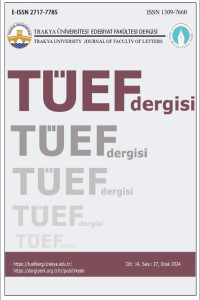Abstract
Chinua Achebe, önemli eseri Things Fall Apart'ta, değişimin eşiğindeki bireylerin ve toplumların karşılaştığı karmaşık mücadeleleri yansıtan baskın bir tema olarak gelenek ve modernite arasındaki gerilimi vurgular. Achebe'nin Igbo toplumunun yaşadığı zorlukları betimlediği eser, bulunduğu ortamın ötesine geçerek kimlik, kültürel evrim ve tarihsel dönüşümün karmaşıklığı üzerine daha geniş toplumsal tartışmalara değinmektedir. Bu bağlamda, bu makale konunun çok yönlü bir incelemesini yapmakta, karakterlerin değişim ve ilerlemeye karşı tutumlarını araştırırken, geleneksel değerleri korumanın ya da modernliği benimsemenin yarattığı ağır sonuçları vurgulamaktadır. Ana karakterlerin, etkileşimlerinin ve seçimlerinin ayrıntılı bir analizi yoluyla bu makale, kültürel mirası koruma arzusu ile ilerlemenin kaçınılmaz çekiciliği arasındaki karmaşık dengeyi ortaya çıkarmaktadır. Bu makale, karakterlerin ikilemlerini inceleyerek, yerleşik geleneklerin rahatlığı ile yeni yaşam biçimlerini benimsemenin cazibesi arasındaki evrensel insan mücadelesine de ışık tutmaktadır. Bunu yaparken, Achebe'nin anlatı sanatının ve Things Fall Apart'ın kültürel dinamikler ve toplumsal değişim hakkındaki çağdaş tartışmalarla tematik ilgisinin daha derinlemesine anlaşılmasına katkıda bulunmaktadır.
Keywords
References
- ACHEBE, Chinua (1958), Things Fall Apart, Oxford, Heinemann.
- ACHEBE, Chinua (1997), “English and the African Writer”, Transition, (75/76), 342-349, doi: 10.2307/2935429.
- ACHEBE, Chinua (2009), The Education of A British Protected Child, New York: Alfred A. Knopf.
- ALLEN, Richard. L. (2001), The Concept of Self: A Study of Black Identity and Self-Esteem, Detroit, Wayne State University Press, s. 17.
- BEGAM, Richard. (1997), “Achebe’s Sense of an Ending: History and Tragedy in “Things Fall Apart””, Studies in the Novel, 29.3, 396–411. http://www.jstor.org/stable/29533223
- HEGEL, Georg Wilhelm Friedrich (2010), The Science of Logic, Translated by George Di Giovanni. New York, OUP.
- IRELE, F. Abiola (2000), “The crisis of cultural memory in Chinua Achebe’s things fall apart”, African Studies Quarterly, 4.3, 1-40.
- MORRISON, Jago. (2018), “Tradition and Modernity in Chinua Achebe’s African Trilogy”, Research in African Literatures, 49.4, 14-26. https://doi.org/ 10.2979/reseafrilite.49.4.03
- OHAETO, Ezenwa (1997), Chinua Achebe: A Biography, Oxford, Indiana University Press.
- POVEY, John (1971), “The Novels of Chinua Achebe”, In B. King (Ed.), Introduction to Nigerian Literature, Lagos: University of Lagos and Evan Brothers Ltd., pp. 25-37.
- RHOADS, Diana Akers (1993), “Culture in Chinua Achebe’s Things Fall Apart”, African Studies Review, 36.2, 61-72. doi:10.2307/524733
- RUSHDIE, Salman (1992), Imaginary Homelands: Essays and Criticism 1981-1991, London, Granta Books.
- THE WORLD FACTBOOK (2023), Washington, DC: Central Intelligence Agency, 2023.https://www.cia.gov/the-world-factbook/countries/nigeria/ summaries
- WHITTAKER, David and MSISKA, Mpalive Hangson (2007), Chinua Achebe’s Things fall apart, New York, Routledge.
Abstract
In his seminal work Things Fall Apart, Chinua Achebe highlights the tension between tradition and modernity as a dominant theme that reflects the complex struggles faced by individuals and societies in the midst of change. Achebe's portrayal of the Igbo community's challenges resonates beyond its setting, speaking to broader societal debates on identity, cultural evolution, and the complexities of historical transformation. In this respect, this paper delves into the multifaceted exploration of the theme, investigating characters' attitudes towards change and progress while highlighting the profound consequences of either upholding traditional values or embracing modernity. Through a close analysis of key characters, their interactions, and their choices, the paper uncovers the intricate balance between the desire to preserve cultural heritage and the inevitable pull of progress. By examining the characters' dilemmas, this paper sheds light on the universal human struggle between the comfort of established traditions and the allure of embracing new ways of life. In doing so, it contributes to a deeper understanding of Achebe's narrative artistry and the thematic relevance of Things Fall Apart in contemporary discussions on cultural dynamics and societal change.
Keywords
References
- ACHEBE, Chinua (1958), Things Fall Apart, Oxford, Heinemann.
- ACHEBE, Chinua (1997), “English and the African Writer”, Transition, (75/76), 342-349, doi: 10.2307/2935429.
- ACHEBE, Chinua (2009), The Education of A British Protected Child, New York: Alfred A. Knopf.
- ALLEN, Richard. L. (2001), The Concept of Self: A Study of Black Identity and Self-Esteem, Detroit, Wayne State University Press, s. 17.
- BEGAM, Richard. (1997), “Achebe’s Sense of an Ending: History and Tragedy in “Things Fall Apart””, Studies in the Novel, 29.3, 396–411. http://www.jstor.org/stable/29533223
- HEGEL, Georg Wilhelm Friedrich (2010), The Science of Logic, Translated by George Di Giovanni. New York, OUP.
- IRELE, F. Abiola (2000), “The crisis of cultural memory in Chinua Achebe’s things fall apart”, African Studies Quarterly, 4.3, 1-40.
- MORRISON, Jago. (2018), “Tradition and Modernity in Chinua Achebe’s African Trilogy”, Research in African Literatures, 49.4, 14-26. https://doi.org/ 10.2979/reseafrilite.49.4.03
- OHAETO, Ezenwa (1997), Chinua Achebe: A Biography, Oxford, Indiana University Press.
- POVEY, John (1971), “The Novels of Chinua Achebe”, In B. King (Ed.), Introduction to Nigerian Literature, Lagos: University of Lagos and Evan Brothers Ltd., pp. 25-37.
- RHOADS, Diana Akers (1993), “Culture in Chinua Achebe’s Things Fall Apart”, African Studies Review, 36.2, 61-72. doi:10.2307/524733
- RUSHDIE, Salman (1992), Imaginary Homelands: Essays and Criticism 1981-1991, London, Granta Books.
- THE WORLD FACTBOOK (2023), Washington, DC: Central Intelligence Agency, 2023.https://www.cia.gov/the-world-factbook/countries/nigeria/ summaries
- WHITTAKER, David and MSISKA, Mpalive Hangson (2007), Chinua Achebe’s Things fall apart, New York, Routledge.
Details
| Primary Language | English |
|---|---|
| Subjects | African Language, Literature and Culture, European Language, Literature and Culture, British and Irish Language, Literature and Culture |
| Journal Section | Research Articles |
| Authors | |
| Publication Date | January 31, 2024 |
| Submission Date | October 9, 2023 |
| Published in Issue | Year 2024 Volume: 14 Issue: 27 |

